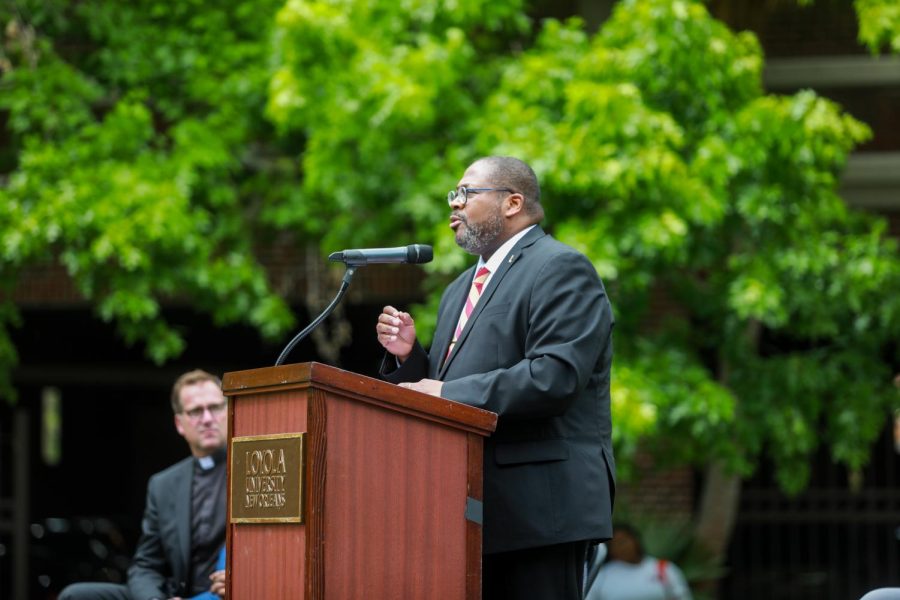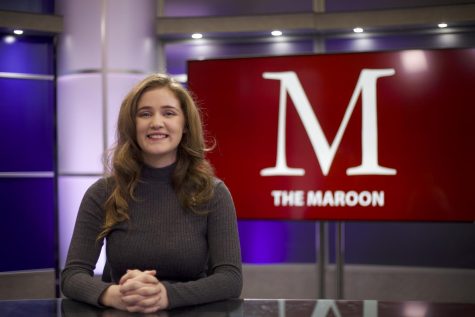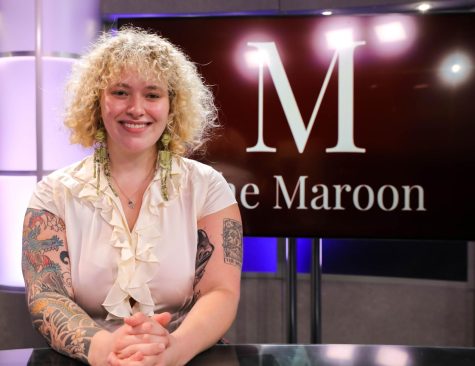Loyola’s 18th president makes history
Loyola’s President-elect Xavier Cole addresses students at his introduction to the university on March 24, 2023. Cole will begin his tenure on June 1, 2023.
March 31, 2023
Loyola University President-elect Xavier Cole was first motivated to work with students and who they become beyond their education while working as a resident assistant at Ole Miss, he said.
“I got a ton of joy out of that. I didn’t know I had that in me,” Cole said. “It seemed like extremely meaningful work.”
It wasn’t until he met a peer of his while in graduate school at Miami University of Ohio that Cole became eager to become a part of the Jesuit system of education.
“He was 22; I was 22. I seemed to be unruddered, and he seemed to be very focused,” Cole said about his friend.
Cole said when he asked his peer what made him this way, he said he was Jesuit educated, which meant they were formed by their education to be a servant leader and to care for others in a way that brought purpose into their life.
“If we can send you out with that sort of intentionality, you’re gonna change the world,” Cole said. “That would be a life well-lived, and really meaningful work for me.”
Now, as the incoming president of Loyola University New Orleans – after 28 years working in higher education, 26 of those years at Jesuit Catholic institutions – Cole said he is excited to be taking on the position.
“I’ve only worked in higher education. This is the only profession I have ever known, the only thing I actually think I know how to do, and so being able to do this at the highest level, being a president, and particularly at a Jesuit Catholic institution, means so much to me,” Cole said.
Who is Xavier Cole?
Cole is set to begin his tenure as Loyola’s 18th president on June 1 of this year, and will be the first person of color and second layperson to hold the position in the university’s history.
Cole holds a bachelor’s in history from the University of Mississippi, a master’s in history from Miami University of Ohio, and a doctorate in higher education management from the University of Pennsylvania.
The majority of Cole’s time working in higher education has been at Loyola University in Baltimore, Maryland. For the last seven years, he has worked at Marquette University, one of Loyola’s sister schools, in Milwaukee, Wisconsin.
Dealing with the COVID-19 pandemic while working at Marquette was what Cole said proved to him he “had the guts” to do this kind of work on a higher level.
“When some would maybe shy away from the difficulty of the moment, I tended to lean in,” Cole said.
Now, as he steps into the role of president, Cole said he is eager to take on more challenges. The job of a university president, especially nowadays, isn’t easy, he said. With workforce concerns following the COVID-19 pandemic, budget challenges, and low enrollment nationwide, Cole said one would need a strong reason to be motivated to take on those challenges. For Cole, that reason is to serve the students.
Making history
Part of the way in which he said he could better serve students is through his experience as a Black man, not just by what he looks like, but how he looks at the world.
“I will have a lens at an aperture that is more open,” Cole said.
“I do see the world a little bit differently as a Black man, but I also understand my privilege as a man. You’re still talking to a Black man and not a Black woman,” he said.
Cole said he sees how important it is to identify where we have and don’t have privileges. When you have awareness of it, then you don’t let that privilege hurt people, and you make sure it can only help people, he said.
“I will use the privilege of a man, and the awareness of a Black man, to open up new doors for everyone,” he said.
Cole also makes history as Loyola’s second layperson to serve as president. As the number of Jesuits declines, Cole said we must prepare lay people, like himself, to understand and carry on this 50-year-old charism so it can live on. And Cole said he believes the Jesuit tradition is something we definitely need to protect.
“The fact that it has survived for 500 years tells you that it’s effective and it’s important. If it wasn’t, it would have gone away, but it persists and it grows,” he said.
Enrollment challenges
And as the number of Jesuits decreases, so has enrollment in universities across the country. Cole said this is one of the most pressing issues in higher education because people are questioning whether the cost of higher education is worth it.
Cole said what we need to tell people who question the value of a liberal arts education is that it gives them the ability to adapt and shift with the times across multiple industries. When industries shift and change, as they inevitably do, what you learn at universities like Loyola will prepare you to handle this.
“I am a double history major. Any parent worth their salt will ask, ‘why are you majoring in history, and what are you going to do with that?’ You can tell them, ‘be president of Loyola University of New Orleans.’”
Faculty and staff salaries
Another issue that has been discussed at length at Loyola is the salary of staff and faculty, which as of the past few years, had been falling behind other universities. The Maroon reported in September of last year that Loyola faculty wages were 25% lower than the national average.
Loyola issued $1.4 million in one-time payments to 212 employees identified as receiving compensation below the target range for their position to rectify the issue of low wages last year. Cole said he will further this effort to offer more competitive wages at the university, as this is not only a justice issue, but a standard of living issue.
“We need to be able to afford a good standard of living for our employees,” he said.
This is something the university has said they aim to do, as mentioned by Interim University President, The Rev. Justin Daffron, S.J. during a town hall to the university last fall, but have not yet put into a permanent plan of action.
Cole said that not only will better wages benefit current staff and faculty, but they also will help to attract better faculty and staff for students in the future.
In touch with the community
Cole said he plans to prioritize staying in touch with the whole Loyola community.
He said his first step will be to begin weekly or monthly emails from the president’s office discussing his vision and direction, what’s happening on campus, and where we need help. But in-person communication is also vital, Cole said.
While at Marquette, Cole would regularly get together over a meal with his departments to build community and discuss vision and strategy. Beyond group gatherings, he also likes to get personal with his university community.
At Marquette, Cole would have a regular sign-up to take somebody from his division on a Cops run, a local hamburger and shake joint. Cole would drive, and his pal for the day would pick the music until they arrived to share a meal together.
“All that time we’re talking. I’m getting to know that person on a personal level. Hopes and dreams but also their family, what they care about,” he said.
That is a tradition Cole said he wants to build upon at Loyola.
“You’re gonna see that. You’re gonna see coffee with Dr. Cole – President Cole, I haven’t said that yet – coffee and donuts with President Cole, walks around Audubon park with President Cole because these poboys are gonna catch up on me,” he said.
Cole said more intimate meetings like that help get people comfortable and allow them to give genuine feedback. It’s also a way that Cole said he could prove he cares.
“You are the most important thing: my people, these people here, this university, are the most important thing to me,” he said.
Cole said another important part of communication is staying in touch with the school’s alumni and supporters.
Cole recalled an instance when he was handed a new copy of a Loyola magazine with former president Tania Tetlow on the cover at his dentist’s office run by Loyola alumni.
“They were very excited about this. If we haven’t reached out to that person to let them know that we see them, that we wanna invite them back and understand how they can be helpful to their alma mater, then we’ve made a misstep,” Cole said.
Expanding on the uniqueness of Loyola
One of Cole’s early priorities is to more effectively communicate Loyola’s achievements, and what makes the university special. He said part of Loyola’s uniqueness is its connection to other Jesuit schools across the country, which hosts a large support network.
During his tenure at Loyola University in Maryland, 35 Loyola University New Orleans students transferred there following Hurricane Katrina in 2005. In that environment, Cole said he also saw what made Loyola University New Orleans students special.
“They were a force of nature. They were different. Their approach was different. Their authenticity, and not that the others weren’t, but they were so open. They were adventurous. Many students were musicians, and they infused our music program like nothing you’ve ever seen before. That was a fun semester playing jazz. They brought a different ethos that was definitely of New Orleans, and definitely of Louisiana, and definitely of the South,” he said. “Why come to us? Because you can’t get this experience anywhere else.”
Macie Batson contributed to this story.









